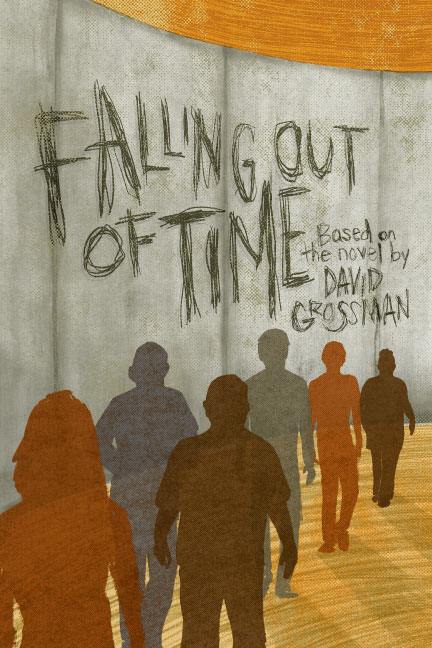During the past seven-odd years that I’ve contributed to DC Theater Arts, I’ve written about upwards of 600 shows—sometimes as the designated reviewer (when I followed criticism conventions) and sometimes as freewheeling columnist (when a colleague was assigned the review so I was at liberty to engage with a work however I wished). Looking back, I realized that the freestyle columns that were most fun to write are still fun to read. I’ve collected here my five faves. —John Stoltenberg
(Read time: about 15 minutes.)
5 reasons Christopher Boone liked ‘Curious Incident’ at Round House better than on Broadway
Originally published December 1, 2019
I had already marveled at The Curious Incident of the Dog in the Night-Time on Broadway, so before seeing the production at Round House I decided to read the novel it was based on. I was so charmed by the voice of Christopher Boone, the fictional narrator, that I could not help but borrow it. —J.S.
My name is Christopher Boone and I am 15 and I am brave and I can do anything. I know that because I traveled by train by myself from Swindon to London and I solved the mystery of a neighbor lady’s murdered dog and I found my mother who I thought was dead and I wrote a book.
A man named Mark Haddon published my book under his own name and called it The Curious Incident of the Dog in the Night-Time. I am okay that he did that, just so everyone knows I wrote it.

My favorite teacher Siobhan made some suggestions but she would tell you I wrote it too. Also I made the drawings.
A man named Simon Stephens made a play out of my book. He told everyone it was based on a book by Mr. Haddon but that was not true. He needed to say it was based on a book by me. Sometimes adults lie. That comes up a lot in my book, especially with Father and Mother. I did not like finding out how much grownups lie because I believed that loving means never lying and I wanted to be loved which meant I did not like being lied to.
I do not tell lies. I can’t tell lies. I don’t know how grownups do it. I think they might have a behavioral problem.
There was a big production made of the play that Mr. Stephens said was his. I went to see it in a big Broadway theater. The stage was inside a big picture frame and there were lots of bright flashing lights and the floor and all the walls were computer screens and there were animated graphics that made me dizzy and distracted and it was hard to pay attention to the characters, even though one of them was Father and one of them was Mother and one of them was Siobhan and one of them was me.
I sat up close but some seats in the theater were so high up and far away I wondered what people in them could possibly see. The play won a lot of awards and a lot of people came to see it. I was okay with that, just so everyone knows it’s about me and my book. I wondered if some people might have thought the play was about computer graphics, though. I could not tell. Everything was enormous, which made the characters seem negligible (which is a word I used in my book once to say how small I felt).
A man named Mr. Stoltenberg took me to see the play at a very much smaller theater with a rounded stage that came right up to the laps of some audience members and no one had to sit very far away at all. Afterward Mr. Stoltenberg asked me if I liked the play better that way and I said yes I did. Then I made a list of reasons why to send to Mr. Stoltenberg as a thank-you for taking me.
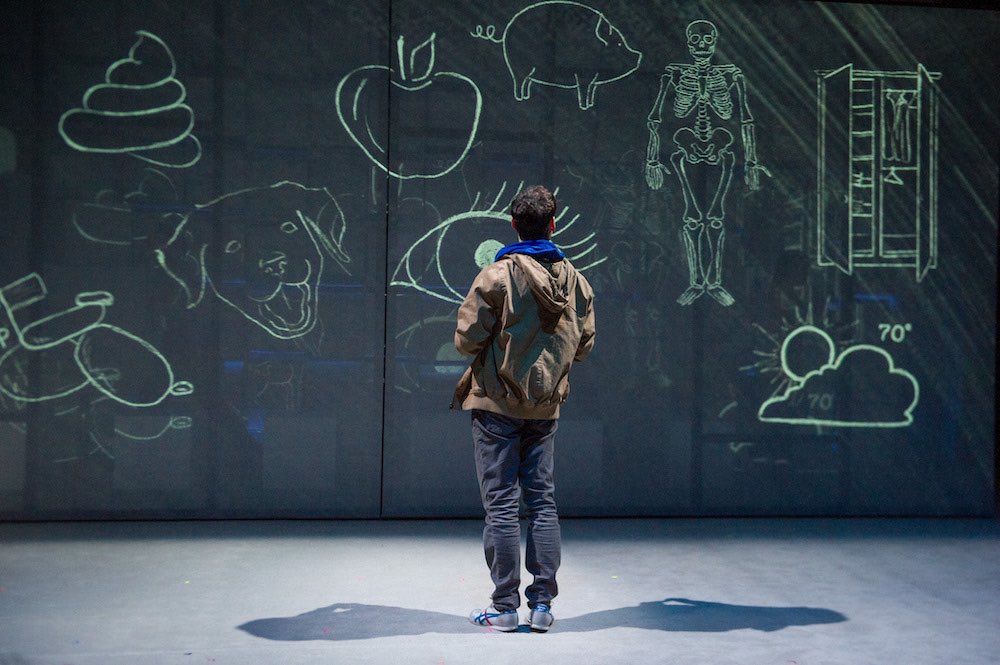
Reason 1. I like to think in pictures. I like to do maths in my head and I’m very good at that and I like to do detecting and think about things logically and I’m very good at that too. But mainly I see what I’m thinking while I am thinking it. I explained that in my book. So l liked it when things my character said or thought appeared projected on a screen like drawings that were as alive as I pictured them to be. It was like the drawings were performing right along with the actor who was pretending to be me. That meant I could see inside my own brain. And when he played Tetris, I could play along.
Reason 2: I say in my book I play computer games but I never said I played Tetris. The people who put on the play made that up. It’s false but it’s not really a lie. And the back wall of the set is made up of boxes like a big Tetris game in three dimensions so it all worked out. The show had a lot of good thinking in pictures like that and it didn’t make me dizzy or distracted.
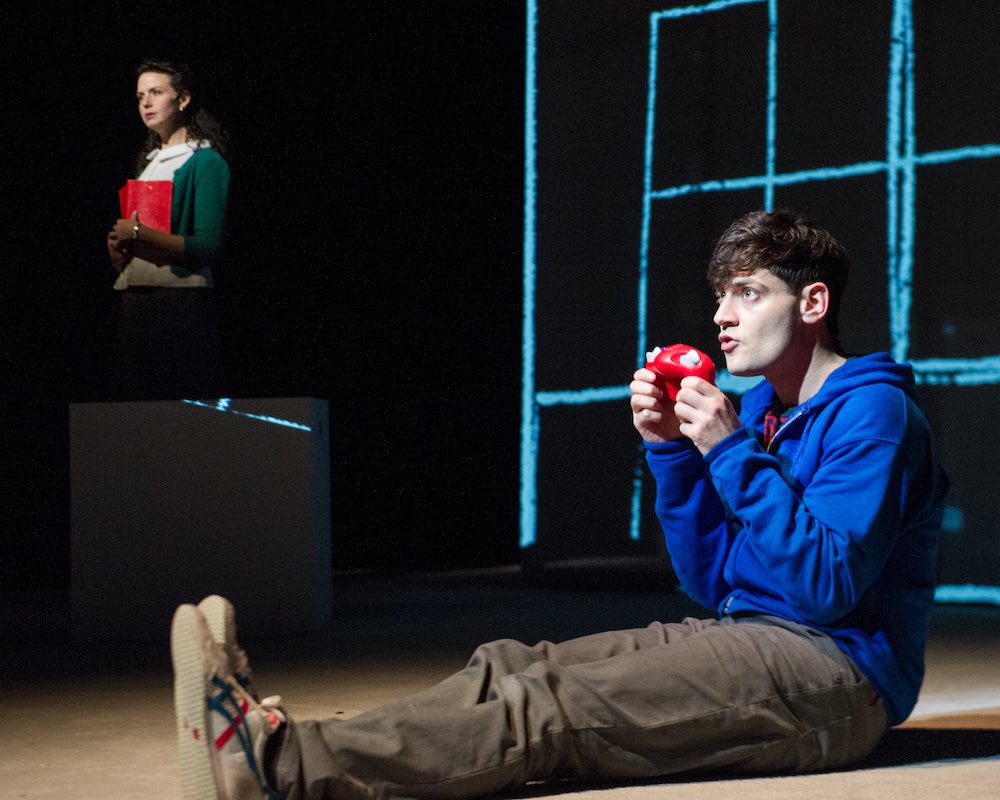
Reason 3. The actor who pretended to be me is named Harrison Bryan and he already pretended to be me once before at another theater. I don’t know if he plans to make a career of pretending to be me but if he did he would be very good at it and I would be okay with that just so he doesn’t do identity theft. A lot of what Harrison Bryan says in the play Mr. Stephens took from my book, but he also says some things Mr. Stephens made up, like for instance this: “I don’t like acting because it is pretending that something is real when it is not really real at all so it is like a kind of lie.” In my book I never said that. People laughed when Harrison Bryan said it but I didn’t get the joke. And I was okay with how Harrison Bryan pretended to be me even though he’s not really me because he did so many true things. Like a lot of times when someone said something to him he would make a look with his face and go hmmm or hunh like he was thinking something that he couldn’t say out loud because Mr. Stephens left it out but Harrison Bryan knew it would be on my mind.
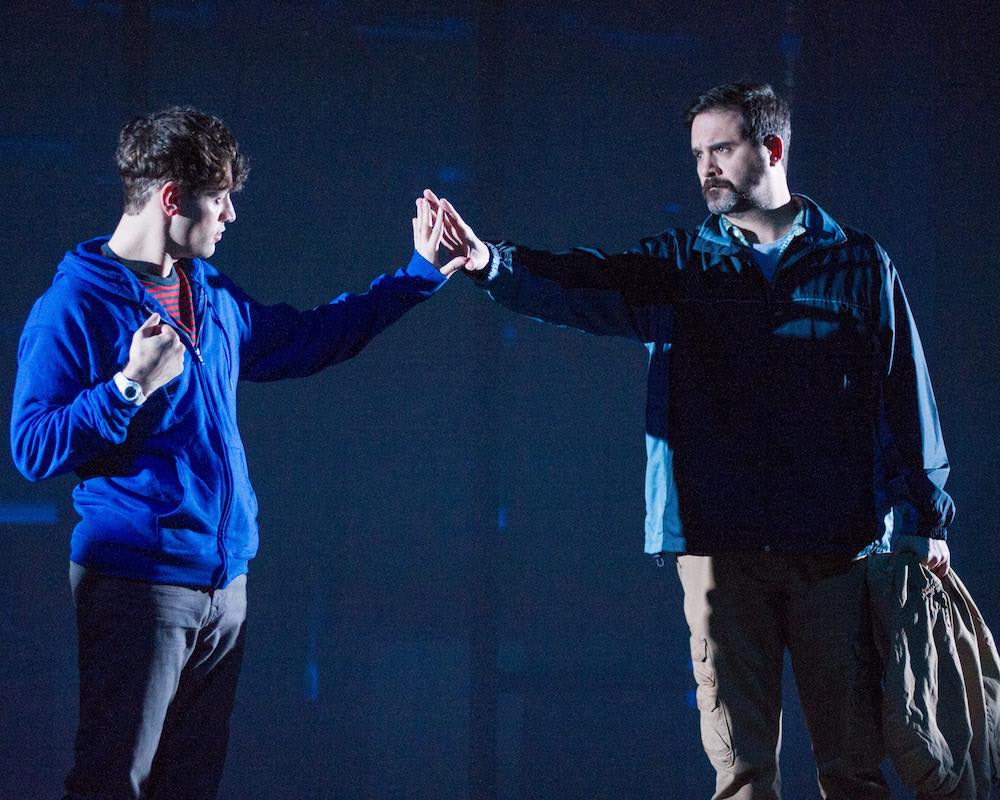
Reason 4: The actors who pretended to be Father and Mother also did many true things and it hurt a lot to watch and remember what happened. Ever since I wrote my book I have not known what to do with that hurt and I could see that Harrison Bryan could not figure that out either. It seems to be a problem that does not lend itself to logic or detecting which made me very sad.
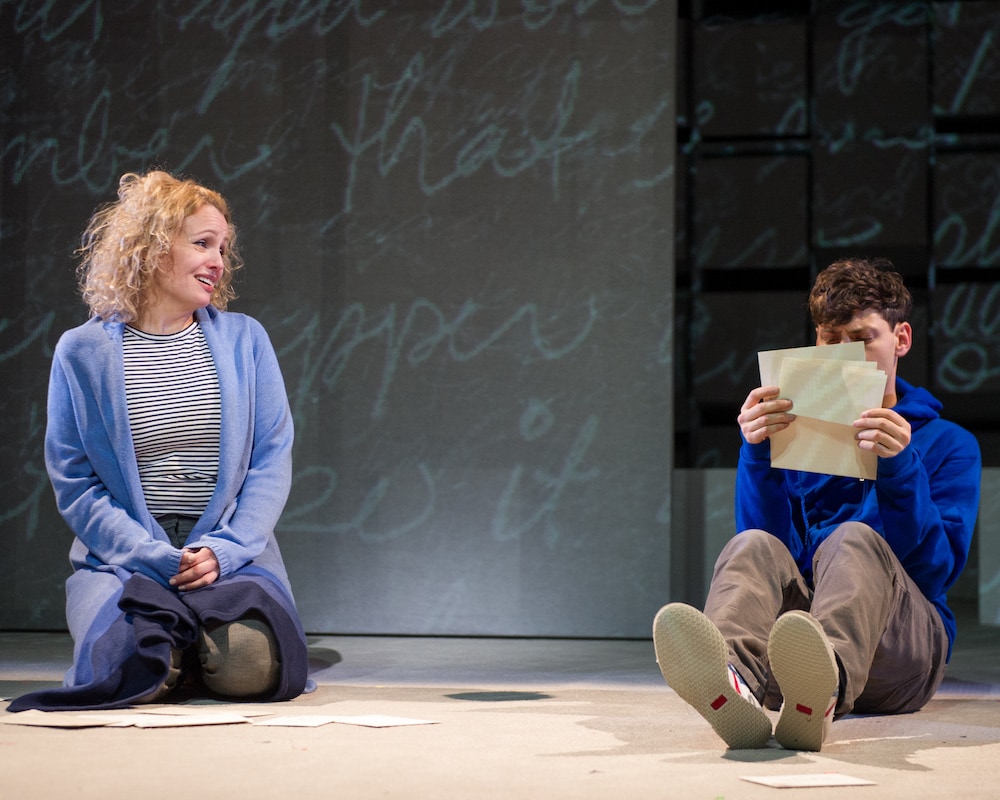
Reason 5: Siobhan. I could not have become me without her. The actor who pretended to be her did so many true things that she made me feel believed in all over again. That made me happy I got to see this version of the show. I wasn’t overwhelmed but I was whelmed. And I know that’s a real word because I looked it up and it means something very good.
Even though in my book I don’t have any friends unless you count Siobhan, which you can’t really do because she is my teacher, if I could I would ask Harrison Bryan if he would be my friend. I like a lot of things about him that I like about me. For instance he seems very good at maths and logic and he is very good to the white rat who pretends to be my pet rat Toby. If Harrison Bryan said yes he would be my friend I would ask him next if he would like to call me Boone Christopher since his own name is backward. He seems like someone who would get that joke.
The Curious Incident of the Dog in the Night-Time (by Simon Stephens, based on the novel by Mark Haddon, directed by Ryan Rilette and Jared Mezzocchi) played November 21 through December 22, 2019, at the Round House Theatre, 4545 East-West Highway, Bethesda MD.
‘The School for Lies’ at Shakespeare Theatre Company
Originally published June 12, 2017
After delighting in David Ives’ rhymed couplets for 90 minutes, something must have rewired in my brain, because I couldn’t quit thinking in them.
The set that we see is a towering eyeful,
The interior decorator spared nary a trifle,
For decked all about are amusing objets d’art
On loan from museums with tastes tres bizarre.
Claes Oldenberg’s oversize cherry and spoon’s
Propped opposite that dog in balloons by Jeff Koons,
Which is hung in a bird cage directly ovah
Salvador Dali’s Mae West lips sofa.
So many cultured sculptures from who knows where,
Plus Pedro Friedeberg’s gold hand chair!
Could it be these fine artworks are what meet our eyes?
Or might we be in for a bigger surprise?
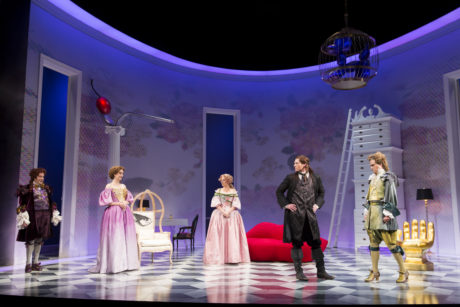
Bingo, in case you’re still paying attention:
This comedy is shot through with pretension.
Ergo its title, a snarky rant
Against society’s predilection for cant.
Mon dieu! another drama about truth and illusion!
Have we not seen such plays in profusion?
Why dust off Molière for our modern amusement?
He’s yesterday’s news, man, what’s the inducement?
The dude wrote in French, he has to be translated
What was funny back then has got to be outdated.
Bottom line, can we enjoy what’s about to go on?
Absolutament! And yes we Kahn.
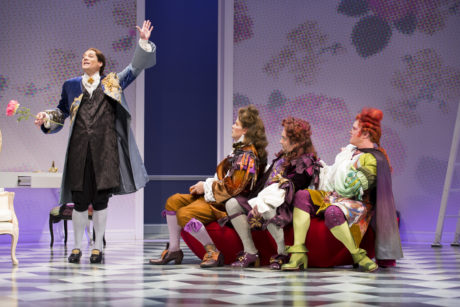
The costumes alone are enough to drop jaws
The foppery and finery would give Sun King pause.
He’d invite the whole cast to Versailles too
Since they’re all worthy of giving high fives to.
I was nuts about the show if you haven’t deduced.
The performance could not have been better produced
But what got me hooked was the way it was written,
David Ives’ script had me totally smitten.
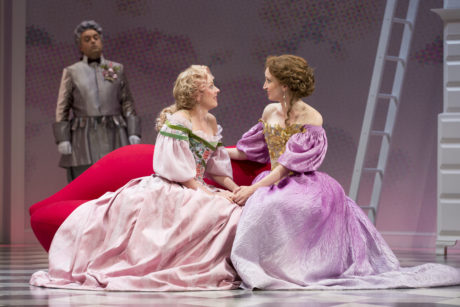
His crackerjack couplets, his playful bag of tricks,
Made my ears want more and more as if I needed a fix.
When he worked in some words that were crude or risque
It was like I’d been tossed a verbal bouquet.
Once he even mimicked Valleyspeak and rap
And my higher cortex went, Oh snap!
For an hour and a half this went on and on
As ear candy goes it was bon upon bon bon
Delicious his rhymes were, like fine French fromage,
I could not resist serving up this homage.
So delightful they were, so wicked and sublime,
Oh yes! said my mind, hit me up one more time!
And then it hit me I’d been guessing or predicting
How each couplet would finish. God it got addicting!
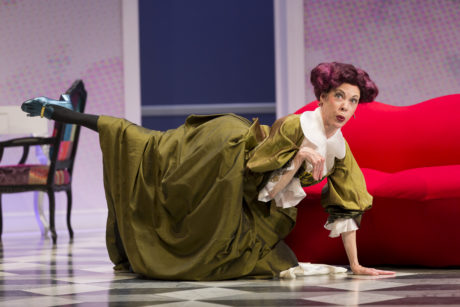
Some might surmise all this rhyming’d be annoying
But I’m here to tell you it was not at all cloying.
It altered my brain, rearranged how I listened
Linguistic piss and vinegar made me totally blissened.
If you see School for Lies, which I heartily recommend
You will hear what I mean: The script has pleasures no end.
The School for Lies (by David Ives, adapted from Le Misanthrope by Molière, directed by Michael Kahn) played May 30 through July 9, 2017, at Shakespeare Theatre Company’s Michael R. Klein Theatre – 450 7th Street, NW, in Washington, DC.
‘Falling Out of Time’ at Theater J in Verse
Originally published March 22, 2016
“Fun to read” does not describe this one. The production was painful to watch. It was unrelievedly about death, about parents who had lost offspring; and despite excellent performances, the play as a whole left me dulled and detached. I wrestled with what to write. Because the script’s central grief had never been mine, it felt wrong to just say “this and this didn’t work for me.” Instead I decided to see if I could get inside the pain that prompted the play. Inspired by the script’s blank verse, I did it this way.
There is so much sorrow in this show
Nine fine actors playing nine parents
All mourning dead children
Searching to see them again
Seeking to be with them one more time
Speaking words of unspeakable loss
Each groping their solitary way
Going in circles
Burdened by unbearable grief
Each child’s dying retold
Each child’s death relived
Mothers and fathers intoning
One by one
Poems of loss and sadness
Lyrical lines of lamentation
Becoming a chorus of bereavement
No longer alone
Finding solace in shared heartbreak
In freeing verse
In full disclosure of private pain
All their sadness aired
No more to be said
Able to breathe again
Still their children are dead
Gone from them
Yet they have found the words
To say what it is like
What it is
To lose the precious life of one’s child
So know this before you go:
It is all in verse
And it is all about sorrow
Soulful sorrow, all of it
A show made solely of sorrow
Yes, one note
A note you may know
But this singular maybe-familiar note has been scored like a magnificent symphony
And it is voiced by nine superb soloists
Who become an exquisite choir
That may lift you up
If you have already known the note
Falling Out of Time (based on David Grossman’s novel, adapted and directed by Derek Goldman) played March 17 through April 17, 2016, at Theater J in the Aaron and Cecile Goldman Theater in the Edlavitch DC Jewish Community Center – 1529 16th Street NW, in Washington DC.
A Love Letter to ‘Dear Evan Hansen’
Originally published August 3, 2015
It’s a show about a kid who writes himself letters, so why not? And I really was this overwhelmed.
Dear Dear Evan Hansen,
I know it might sound odd, but this is a love letter to a musical.
I saw you for the first time in my life last night, and I knew right away I had to write you to tell you it was love at first sight. You moved me, you thrilled me, you out and out wowed me. (Gosh, I hope you will not think me weird for gushing.)
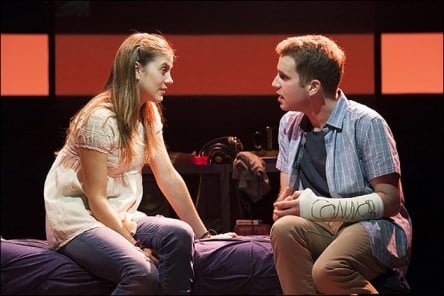
You’re a musical about a lonely and depressed high school senior named Evan Hansen who writes letters to himself to cheer himself up—which is why you’re called Dear Evan Hansen (duh). What happened last night, though, was that you cheered me up. I remember when we finally had to part, I left you where you’re staying at Arena Stage (I assume that’s temporary and you’ll be relocating to Broadway, where I hope we can meet up again, because I really want to stay in touch). As I walked out into the summer night, I found I could not shake the feeling of elation you had given me. So I figured you might understand why I felt compelled to publicly declare my passion for you this way.
I haven’t yet read what any of your other admirers may be saying about you. I can only imagine they were similarly smitten. (How could they not be?) But I hope you will take to heart this letter to you, because there’s something really important and personal I want to share with you.
And it’s this, dear Dear Evan Hansen.
Until I met you I had never in my life seen a musical I would call redemptive. I don’t mean redemptive in any divine sense, because you never mentioned faith. I mean in the very human sense of revealing to us a very identifiable inner self that feels so isolated and unworthy it will pretend to be someone else for acceptance. (You nailed it: Everyone’s got Imposter Syndrome. We’ve all been there done that.) And then you showed that self be caught in a Really Big Lie and stricken with recrimination.
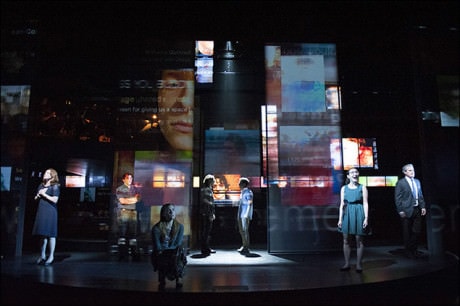
You presented a central character, Evan, whose dramatic character arc is actually a profound trajectory of conscience—who despite his good intentions in deceiving others comes to realize that he has totally, totally screwed up. The deception he committed was so wrong he cannot stand himself. And by that point in the second act when Evan falls apart emotionally in a morass of crushing guilt and remorse (in his song called “Words Fail”), you embody on the stage such a searing image of a self feeling utterly irredeemable that I was stunned into awed silence. You dug a hole for your main character so deep it seemed impossible to climb out of, and you dramatized exactly what being at a moral nadir feels like.
What happens next, though—and what prompted me to write you this letter—is that you found a way for that main character to atone and go on. It was as if a redemptive miracle occurred on stage, except of course there was no divine intervention. There was only the careful, conscientious craft of a brilliant book writer (Steven Levenson) and two equally brilliant composer/lyricists (Benj Pasek and Justin Paul). Together they had told a story on stage so original, emotionally identifiable, and redemptive that what’s possible to achieve in a musical got a Big Bang that will ripple through theater history from now on. Plus everyone who attends can come out a healed and happier person.
Thank you, dear Dear Evan Hansen.
Sincerely,
Me
Dear Evan Hansen (book by Steven Levenson, lyrics and music by Benj Pasek and Justin Paul, directed by Michael Greif) played July 10 through August 23, 2015 in the Kreeger Theater at Arena Stage at the Mead Center for American Theater – 1101 Sixth Street SW, in Washington, DC.
‘The Norwegians’ (‘Da Norvegians’) at Scena Theatre by a Norvegian
Originally published March 30, 2015
This last one is all for laughs, but first a serious setup: Before my forebears came to America where they became “white,” they were German in Germany (on my mother’s side) and Norwegian in Norway (on my father’s). I do not much own my cultural heritage anymore, but I keep working at renouncing the white privilege that my lineage made my birthright. To that end, I find, the best takedown is sometimes a sendup.
So dere’s dis play goin’ on in town called Da Norvegians, and it’s set in Minneapolis and it’s got Norvegian characters in it, so I tought I should go check it out, on accounta I vas born dere and grew up dere an’ my fodder vas Norvegian, so I know da lingo pretty good, doncha know. I tought maybe I could assess da play for accuracy in how it depicts my Minnesota Luteran cultural milieu, ya know. Plus it mentions lutefisk, vich I myself ate ven I vas a child, dough I hated it. I hated everyting about it: da smell, da taste, da consistency, vich vas like rubber. It’s a traditional Norvegian delicacy but I could never understan’ vy dey dint yust leave it back in Norvay. Ennaway, dat vile fish vas served special at Christmas in my fodder’s fodder’s dining room in Minneapolis, and I never hauled off and said how much I hated it, ’cause dat vould not be nice.
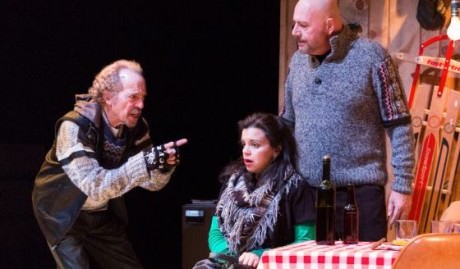
Nobody in da Minnesota Luteran family I grew up in ever hauled off an’ said anyting. It vas yust not done, doncha know. Dere vas an unspoken ting dat it’s a sin to be angry or rude or confrontational. So you learn to lump it and stuff it. C. Denby Swanson who wrote Da Norvegians got dat part right fer sure. Dere are dese two Minnesotans, Tor an’ Gus, who are business partners, an’ dere business is contract killing—vich isn’t very nice necessarily, but neverdaless Ron Litman and Brian Hemmingsen who play dem make it very funny how dey practice dere profession using nice manners. Dere’s a lotta laughs about dat, you betcha.
Dere are also two non-Minnesotans in da play, and you can tell dey are from elsewhere because dey are not Norvegian and dey don’t talk Minnesotan at-tall. Dey are two vimmin named Betty and Olive. Betty is from Kentucky and Olive is from Texas, an’ it turns out dey vere boat dumped by dere respective boyfriends and so dey become clients of contract killers to off dere not-nice boyfriends. Uff-dah! Dat makes for very funny complications, you betcha. An’ Nanna Ingvarsson and Nora Achrati who play dem are so funny dey reminded me of dat British comedy team Joanna Lumley an’ Jennifer Saunders. Someone should write a notter play for dem two because it’s so rare dat vimmin togedder get to be over-da-top hilarious like Ingvarsson and Achrati are ven dey are trash-talkin’ dere fateless men.

I got to tinkin’ dat if dese two vimmin characters vere Minnesota Norvegian, dere vould be no play, because it’s not nice to kill your boyfriend yust because he dumped you, an’ every Minnesota Norvegian knows dat, doncha know. If dey vere Minnesota Norvegian vimmen, dey vould need a much bedder reason den dat to kill dere boyfriends! Dern tootin’! Minnesota Norvegian vimmin dumped by ex-boyfriends yust lump it and stuff it. So it’s a good ting fer dis funny play dat Betty an’ Olive came from Kentucky and Texas.
The Norwegians (by C. Denby Swanson, directed by Robert McNamara) played March 19 through April 19, 2015 at Scena Theatre, performing at the Anacostia Playhouse – 2020 Shannon Place SE, in Washington, D.C.


